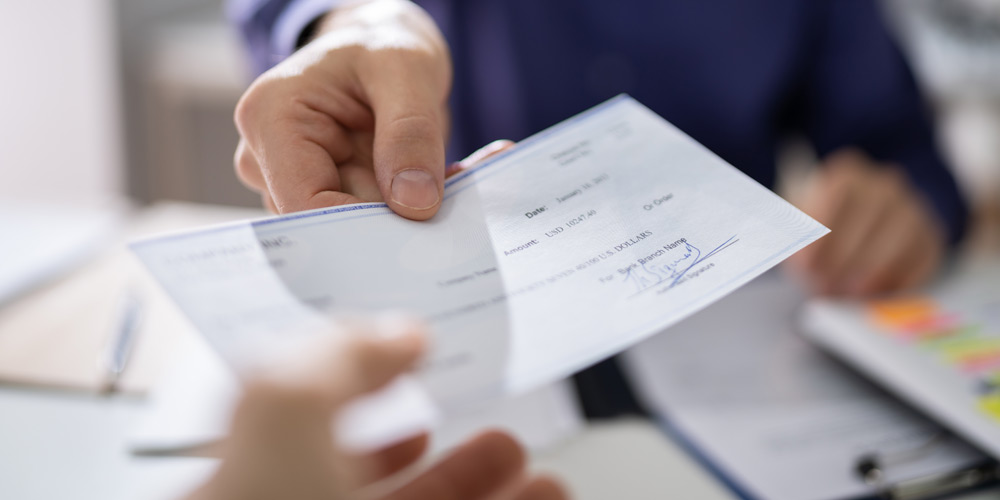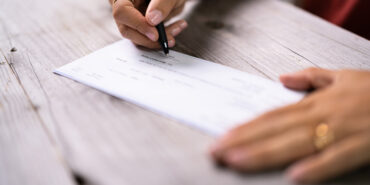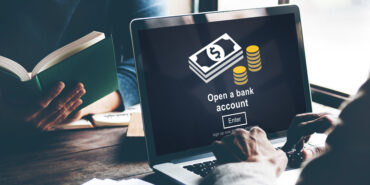How to Cash a Check Without a Bank Account

Did you know 5.9 million American households don’t have a bank account? That means managing daily life without common financial resources or services.
Like check cashing.
The good news is that you’re not stuck with a worthless piece of paper. You can still cash a check without a bank account, but you’ll have to jump through a few hoops to make it happen. And you’ll likely pay in convenience and fees.
Ready to cash a check without a bank account? Here’s what you need to know.
Can I cash a check without a bank account?
The short answer is yes. You can cash a check without a checking or savings account of your own. But expect to put in extra legwork to make it happen. You can do it through one of the following sources:
- The issuing bank
- A retailer
- An ATM
- A check-cashing outlet
- A friend or relative
What should I bring with me to cash a check without a bank account?
Don’t forget to bring these two important items:
- A check
- A valid form of identification
No. 1: Check
The check must be completely filled out by the issuer. It should be addressed to you or the person cashing the check. Make sure it’s signed by the check issuer and then endorse it with your signature on the back.
If a check is missing this information, it will be returned to the issuer, resulting in delays and fees.
Types of checks you can cash include, but are not limited to:
- Personal checks
- Pre-printed checks
- Payroll checks
- Cashier’s checks
- Money order
- Government checks
- Tax checks
- Retirement disbursement checks
Be wary of personal checks. They are harder to cash than other types of checks. For example, retailers have a maximum limit of only a few hundred dollars and many check-cashing stores don’t accept personal checks at all. If possible, request a cashier’s check or money order instead. Both of these options are prepaid checks, which are easier to cash.
No. 2: ID
You need a valid form of identification. In some cases, you will need two. Acceptable forms of ID vary, so do your research.
Valid forms of ID include, but are not limited to:
- State-issued ID
- Driver’s license
- U.S. passport
- Tribal ID
- Military ID
- Green card
- Resident alien ID
Where and how can I cash a check without a bank account?
- At the issuing bank — this is the bank name printed on the check
- At a retailer, such as certain department stores and grocery stores
- At an ATM — this requires a prepaid card
- At a check-cashing outlet
- Through a friend or relative
Several of these options include fees and might be time-consuming. Remember, small fees add up over time.
No. 1: Issuing bank
The first place to start is with the issuing bank. An issuing bank is a financial institution that manages the account of the person who wrote the check.
You can find this information printed on the check. Still can’t locate the issuer? Try searching the routing number online to find the associated financial institution.
Before visiting the issuing bank, bring the check and a valid form of identification. Banks will often ask for an ID to verify your identity before they can cash a check. And expect to pay a fee, typically withdrawn from the total amount of the check.
No. 2: Retailer
Some big-box retailers and grocery stores have dedicated customer service desks or money service centers to assist people with check cashing. Retailers usually set fair fees, making them a cheaper option than other financial institutions, like check-cashing outlets.
Retailers also often have maximum check amounts. This means you won’t be able to cash a check if it’s five figures or above. But if you’re cashing a check under a few thousand dollars you should be fine. It’s worth it to research limits and fees ahead of time; also compare different retailers, because policies vary.
No. 3: ATM
Have you considered a prepaid card account? Unlike a debit or credit card, a prepaid card isn’t linked to a bank account. The benefit of a prepaid card is only being able to spend the money loaded onto the card — avoiding interest rates, fees, and overdrawn accounts.
Some banks will let you cash a check at their ATMs if the money is loaded onto a prepaid card account. This is a great way to avoid the hassle of long lines at a bank, store, or retailer. Expect to pay a per-check fee, as well as a monthly service fee for the card account.
No. 4: Check-cashing outlet
A check-cashing outlet (CCO) provides a variety of financial services, including cashing checks, wire transfers, currency exchange, payday loans, and more. Although convenient, these outlets are also the most expensive option. It’s a good rule of thumb to use a check-chasing outlet as a last resort rather than a go-to option.
A CCO often charges a one-time percentage of the check instead of a flat fee. But some outlets charge a flat fee on top of the percentage. That’s why it’s important to do your research about rates ahead of time.
For instance, you cash a $600 check at a CCO that charges a 2% fee. It will cost you $12 to cash the check. You’ll receive $588 in cash back, less the $12. If the CCO also charges a flat fee of $5 for each check, you’ll only receive $583 in cash back. These fees add up over time, potentially costing you hundreds of dollars every year.
No. 5: A friend or relative
Ask a trusted friend or relative who has their own bank account if they can deposit your check. To do so, endorse the check by writing your signature on the back of the check, and include a note about how you would like the money deposited into their account. This person can deposit the check into their account and then pay you back in cash.
But be careful. You won’t have to pay a check-cashing fee, but you could lose all of your money. By willfully signing over your check, you are at this person’s mercy. A bank won’t be much help in this situation. And going the legal route is another headache. So only hand over your check to a trustworthy person.
Do these options have a check-cashing limit?
Cashing a check in a large amount can be complicated. That’s because check cashing limits vary, often by state, retailer, and store.
For instance, Walmart has a check-cashing limit of $200 for personal checks, $5,000 for all other checks, and $7,500 for checks cashed between January and April (to accommodate tax refunds). You can find detailed information on most retailers’ websites.
If you have a check in a large amount, work directly with the issuing bank. Be prepared to wait longer than normal to receive your funds and to pay a higher fee.
How do I avoid relying on these methods to cash a check?
Save yourself the headache and money by opening a bank account. Check with your local bank or credit union to explore your options.
Once you have a checking or savings account, you can quickly and conveniently deposit your check at a bank, at an ATM, or through mobile deposit.
Bottom line
You have options to cash a check without a bank account, but it might cost you in convenience and fees.





